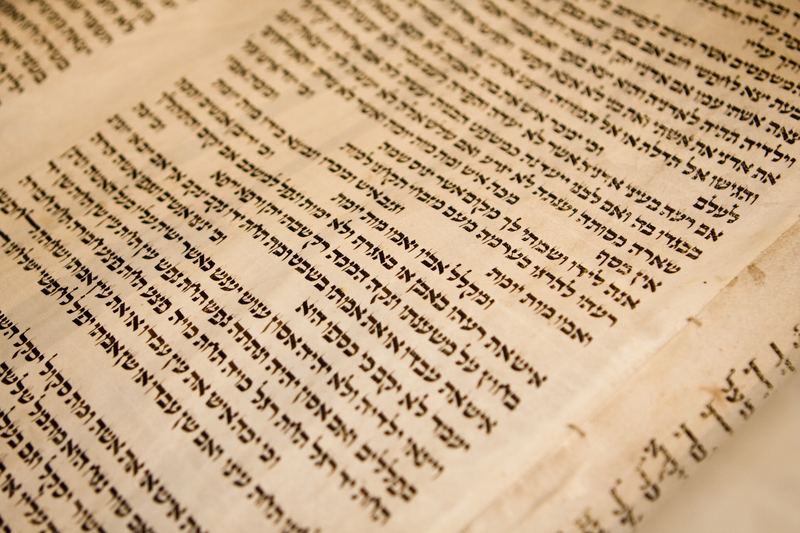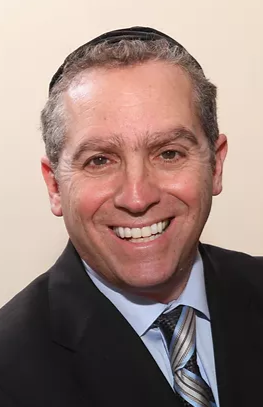
At the end of last week’s Parasha, we learned that Yaakov received the Berachot from Yitzchak, and for this reason his brother Eisav wanted to kill him. So his mother Rivkah told Yaakov to run away to her family in Charan, to her brother Lavan’s home, until Eisav calmed down.
Vayetze, this week’s Parasha, begins with Yaakov on the way to Charan. Yaakov stops off to sleep at what will become the future Beit Hamikdash. Before Yaakov lies down, he places twelve stones around his head to protect himself from wild animals. The question is asked: "How is putting twelve stones around his head going to protect him from wild animals?"
One explanation is that Yaakov had to make only the minimum Hishtadlut (effort) to protect himself from the animals and not rely on a miracle. Another commentary says that Yaakov’s journey symbolizes B'nai Yisrael going into exile (Galut). The most important thing that we as Jews must try do is protect our minds from the pernicious influences that lie within society all around us. We must know that we as a people are Kedoshim. The word Kadosh means “holy” and implies separation of ourselves from the harmful forces that surround us.
That night Yaakov has a dream: “He dreamed that there was a ladder going from the ground up to the Heavens with Malachim (angels) going up and down the ladder.” One interpretation of this dream is that it symbolizes spiritual growth, which should be taken one step at a time: ketzat, ketzat (little by little). Also, the fact that the ladder is rooted on the ground but the top reaches the Heavens symbolizes that we as religious Jews should know that even though our feet are on the ground, our head and our minds should be focused on Hashem and spirituality.
Rabbi Frand asks: "What is the significance of the ladder?" The Baal HaTurim points out that the Hebrew word for ladder has the same numeric value as the Hebrew word for money. The image of the ladder is supposed to send a message to Yaakov that he is going through a major transition. In the house of his father, he sat and learned. He established a reputation as an “ish tam yoshev ohalim” – a pure man, who sits in the tents (of learning). He had no financial worries. He lived a life devoted to spiritual growth and self-improvement. Now he was going into the “real world”, one that would not be as cloistered. He is going to need to deal with Lavan, the quintessential con-man.
The message is that Yaakov’s success in the “real world” would hinge on how he would deal with the issue that stays with us for most of our adult lives – supporting ourselves and our families. This issue can overtake a person and upset him and his spiritual goals in life.
Life is like this ladder – there can be tremendous ascent and tremendous descent. It is not inevitable that when one leaves Yeshiva, everything spiritual may be “down-hill from now on.” On the contrary, a person can grow through challenge and adversity. If a person can cope with those difficulties and grow under those situations, then he can ascend rather than descend. He can rise from the ground to the heaven! If on the other hand, he allows the challenges of earning a living to consume him, then a person can suffer serious spiritual descent.
When Yaakov reaches Lavan's home, the first person to greet him is Rachel at the well. Right away, Yaakov decides that he wants to marry Rachel. He makes a deal with her father Lavan to work for seven years in order to marry her. Yaakov was warned about the nature of Lavan and that he would probably try to trick him into marrying his older daughter Leah first. So Yaakov gives Rachel special signs for the wedding night to protect him from Lavan's tricks of "Bait and Switch".
When the night of the wedding arrives, Rachel feels sorry for her sister Leah so she gives Leah the signs. Rachel is willing to sacrifice her love for Yaakov and her place as one of the mothers of Klal Yisrael. To embarrass someone is a very big sin. The Ten Commandments include the injunction lo tirtzach, do not murder, but murder according to our rabbis refers also to spiritual death. When you embarrass someone, you can see all the blood rush to their face. They have been diminished and injured on a spiritual level.
Some years later, Leah has four sons and Rachel is still childless. In Perek 30 Passuk 14, a strange dialogue occurs: "Reuben went out in the days of the wheat harvest; he found dudaim in the field and brought them to Leah his mother and Rachel said to Leah, Please give me some of your son's dudaim. But Leah replied, Was your taking my husband insignificant? And now to take even my son's dudaim!" Rachel replies, “Therefore, he shall lie with you tonight in return for your son's dudaim." The dudaim were used for fertility purposes and since Rachel didn't have any children yet, which caused her great unhappiness. Now, Leah reprimands Rachel: "You took my husband and now you want my son’s dudaim?" How could Leah be so ungrateful and insensitive?
In order for us to understand how Leah is being insensitive to her sister Rachel, we must realize the magnitude of the Hesed that Rachel did for Leah. Rachel could have Bert easily made it a practice to remind Leah of the favor she did for her on a daily basis. Instead, Rachel performed the ultimate mitzvah by following the precepts of Hashem through her considerate behavior. Because Rachel was so discreet in her generosity and kindness, Leah did not even know that she was indebted to Rachel.
The Torah continues to tells us that when Leah gave birth to her fourth son, Yehudah, she said “This time I will give thanks to G-d” (29:35). The Midrash says that Leah “acquired for herself” the attribute of giving thanks, and that her descendants continued to emulate her attribute of thanksgiving.
Rav Hutner points out that the Hebrew word for “admitting” and the Hebrew word for “giving thanks” are one and the same — Hoda’ah. The Amidah blessing of thanksgiving begins with the words “Modim anachnu lach”. Rav Hutner says that the literal translation of these words is not “we thank You”; rather “we admit to You”.
Rav Hutner explains that a person’s ability to give thanks is based on his ability to admit that one is incomplete. If a person gives thanks to someone, it indicates that the favors and kindness of others was needed. This is why it is sometimes so difficult for us to say “thank you” — because it is difficult for us to admit that we were in need. The greater the gifts that we receive from someone, the more difficult it is to say “thank you”, because a greater gift indicates our greater need.
It is sometimes difficult to give thanks to parents because we need them so much. They have given us so much. It is sometimes very difficult to thank our spouses because we know that we are incomplete without them. In order to say thank you a person must have the ability to admit that he is less than perfect.
The following story is told by the daughter of Bernard (Baruch) Zeldman, who was born in the town of Simferopol, Russia in 1934. Baruch was nine years old when Russia entered World War Two. His childhood mostly consisted of him, his 15-year-old sister, their mother and grandmother fleeing eastward as the Nazis pushed further into Russia. They lived in bombed out buildings, basement shelters, overflowing refugee centers and sometimes open fields where, after days of traveling by foot, they dropped from exhaustion. Nourishment often consisted of furtively digging potatoes out of the frozen ground of local farmers in the middle of the night.
The Russian government decided to send hundreds, including my father and his family, on a large barge that traveled east down the river. They would stop at neighboring villages and ask locals to take in families. The response in most places was, “We’ll take anybody but Jews.” As the days wore on and rations were running low, my father, at this point seven or eight years old, was getting quite sick and weak. At every stop, they were desperately hoping for a salvation.
Finally, a young, non-Jewish Russian woman came to the port and said, “I want to take in a Jewish family.” Her name was Mavra and my father and his family lived with her for many months. She saved their lives. Throughout the long, cold Russian winter she fed them, gave them shelter and taught them how to milk the cows, harvest the crops and fix machinery.
But as the Nazis grew ever closer, my father and his family had to pick up and leave. He vividly remembers the conversation that took place as they were saying goodbye to Mavra. “You saved our lives and there’s no way we can repay you. You’re not Jewish. Why did you specifically ask to take in a Jewish family?” Mavra replied, “Years ago when I was young, my parents were imprisoned by the Russians for anti-communist activity. I was alone, and the government sent me to Siberia for two years. After a train ride that lasted days, I arrived late one night at the station in Siberia. I didn’t know a soul, I had no money, and it was absolutely freezing outside. I had no idea how I was going to survive the night, never mind two years! “And then, out of nowhere, a man appeared and offered to take me into his home. They didn’t have much but they made me a part of their family. They clothed me, fed me and saved my life. But there were a few things that were strange about them. They were always immersed in big books written in a funny language that reads right to left. The wife had her hair covered. They had a special ceremonial meal every Friday night and strange holidays and customs. When my exile to Siberia was over and I was getting ready to depart, the father took me aside and said, ‘Mavra, you don’t owe us a thing. We did this purely from our hearts. There’s only one thing I ask of you. If one day you ever come across Jews who are in trouble or need help, pass on this favor to them.’”
May we all go through life with the goal to help our friend in need but also to be aware and do it in the most discreet way to avoid any embarrassment to them. May we also be sensitive to reach another Jew in need even though we don't know them because we all come from the same family as we are all brothers and sisters of the Jewish nation.
Parasha perspective By Jack E. Rahmey from the teachings and guidance of Rabbi Amram Sananes.








